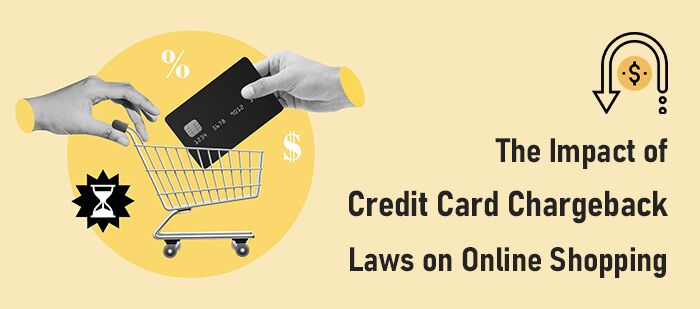
Online shopping has become increasingly popular in recent years, with more and more consumers turning to the internet to make their purchases. However, with this rise in online shopping. There has also been a surge in cases of fraud and disputes between consumers and merchants.
This is where credit card chargeback laws come into play. These laws provide protection for consumers who use credit cards to make online purchases, ensuring that they are not held liable for fraudulent charges or unsatisfactory products. In this blog post, we will explore the impact of credit card chargeback laws on online shopping and how they help to protect consumers in the ever-evolving world of e-commerce.
Understanding Credit Card Chargebacks and How They Work
Credit card chargebacks serve as a financial safeguard for consumers. Allowing them to dispute a transaction and potentially get their money back under certain circumstances. This process begins when a cardholder files a complaint with their credit card issuer, claiming a problem with a transaction.
This can range from not receiving the goods or services they paid for, to being charged more than the agreed price, or even becoming a victim of fraud. Once the complaint is lodged, the credit card issuer investigates the claim by reviewing the transaction details, communicating with both the consumer and the merchant involved.
If the issuer finds in favor of the cardholder. The transaction amount is temporarily credited back to the consumer’s account, pending a further investigation. At this point, the merchant has the opportunity to contest the chargeback, providing evidence to support the legitimacy of the transaction.
This back-and-forth can continue until a final decision is made. It’s a critical process that balances protecting consumer rights while giving merchants a fair chance to validate legitimate transactions. Understanding how chargebacks work is essential for both parties involved in online shopping. As it directly impacts the resolution of disputes and the protection against fraudulent activities.
Some Related Blogs
- Fraud Scoring: The Key to Reducing Chargebacks
- The Ins and Outs of Visa Dispute Arbitration
- Understanding the Importance of a High Return Customer Rate
- Arbitration Chargeback: What You Need to Know
Key Credit Card Chargeback Laws Every Consumer Should Know
At the heart of credit card chargeback protections are several key laws and regulations every consumer should be aware of to fully understand their rights when shopping online. The Fair Credit Billing Act (FCBA) is a cornerstone regulation that provides consumers with the right to dispute billing errors. Including fraudulent charges, on their credit card statements. Under the FCBA, consumers have 60 days from the statement date to report such discrepancies to their credit card issuer to initiate a chargeback.
Another pivotal piece of legislation is the Electronic Fund Transfer Act (EFTA), which, although primarily concerned with electronic transfers, intersects with credit card transactions in the realm of unauthorized or fraudulent transactions. It highlights the importance of promptly reporting lost or stolen cards to limit consumer liability for unauthorized charges.
Consumers should also familiarize themselves with their credit card issuer’s specific policies on chargebacks. As these can vary and may offer additional protections beyond what is legally required. Understanding these laws and issuer policies empowers consumers to navigate the online shopping landscape more securely, knowing they have mechanisms in place to contest questionable charges and protect their financial interests effectively.
The Merchant’s Perspective on Chargeback Laws and Their Consequences
From the merchant’s viewpoint, credit card chargeback laws can be a double-edged sword. While they are designed to protect consumers from fraud and unsatisfactory transactions, these laws can also present challenges to businesses. Especially small online retailers. Chargebacks not only result in lost revenue but can also incur additional fees from payment processors, impacting a merchant’s bottom line. Moreover, a high number of chargebacks can damage a business’s reputation with credit card processors, leading to higher processing fees or, in extreme cases, the termination of the ability to accept credit card payments altogether.
![]()
Email us anytime!
Email customer service 24/7
![]()
Call us anytime!
Reach customer care 24/7 at +1 (888) 901-8653
Merchants must navigate the complexities of chargeback laws carefully, implementing robust fraud detection and prevention measures to minimize the risk of disputed transactions. This includes clear communication of return policies, accurate product descriptions, and providing exemplary customer service to address any issues before they escalate to a chargeback.
Additionally, maintaining thorough records of transactions and customer communications can be invaluable in disputing unwarranted chargebacks, demonstrating that the transaction was legitimate and that the product or service was delivered as promised.
Understanding and effectively managing chargebacks is crucial for merchants to protect their business interests while upholding the standards of customer service and satisfaction that credit card chargeback laws aim to ensure.
Steps Consumers Can Take to Protect Themselves From Fraudulent Transactions
To fortify themselves against fraudulent transactions, consumers can employ several proactive strategies. First and foremost, monitoring credit card statements regularly is essential for early detection of any unauthorized charges. Enabling transaction alerts on credit cards can provide real-time notifications of card activity. Allowing consumers to quickly identify and report suspicious transactions. Using secure and unique passwords for online shopping accounts, and changing them regularly, adds an extra layer of security against potential breaches.
Additionally, consumers should be cautious about sharing personal and financial information, especially on websites that do not have secure sockets layer (SSL) encryption, indicated by “https” in the web address. Shopping only on reputable and well-known websites can also decrease the risk of encountering fraudulent merchants. Implementing two-factor authentication (2FA) where available can further protect online accounts from unauthorized access.
Finally, being aware of the common signs of phishing scams—such as unsolicited emails or messages asking for personal information—and knowing how to report them is crucial. By taking these steps, consumers can significantly enhance their defenses against the threats posed by online fraud and misuse of their credit card information.


